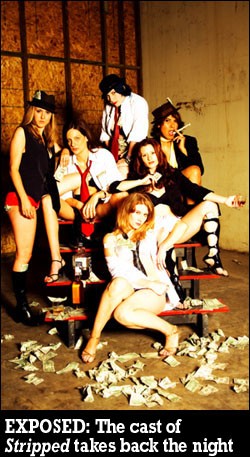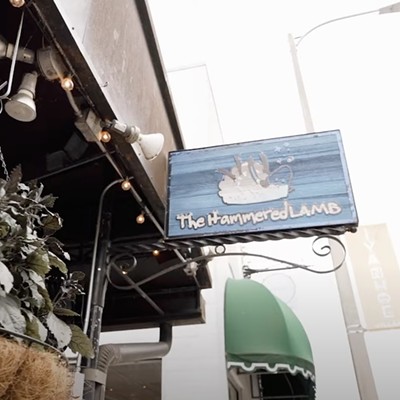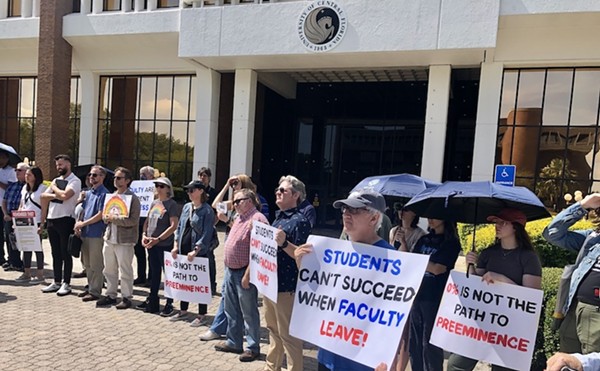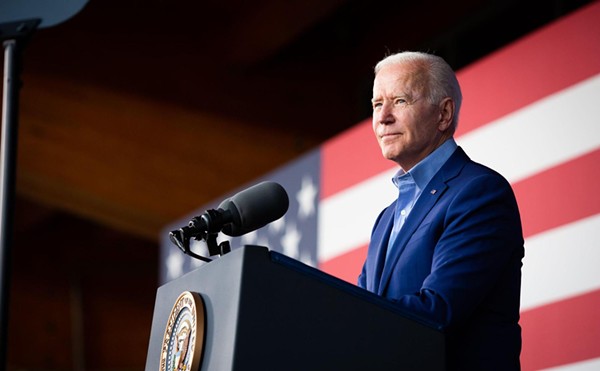Inside a seedy Maitland warehouse, six would-be exotic dancers are being put through their paces. A single low-wattage light fixture casts dim yellow illumination on their scanty outfits and lazily suggestive movements. A dingy scrap of carpet is laid out on the crumbling floor in emulation of a strip-club runway; at either end, a hand truck and a beat-up wooden upright serve as makeshift stage poles. A humble audio system carries a slow, sinuous beat as the ladies gyrate in time.
What's going on here, it's obvious, is not bawdy boy-baiting but a theatrical approximation of same: Even the lowest-scale gentleman's club wouldn't dream of holding auditions in a location this squalid. The rehearsal area resembles the set of Reservoir Dogs, while the men's room is more like something out of Saw. Yet it's the site where The Empty Spaces Theatre Company has chosen to rehearse Stripped, one of the more provocative entries in Orlando's third annual new-play festival. A freshly penned drama that plays up the intersection of mind and body, the show takes place in a "subreality" in which the dancers' deepest thoughts come to life via carefully synchronized soliloquies and interpretive movements.
Three at a time, the dancer/actresses take to the carpet to perform tandem routines while a fourth sits on a nearby stool and delivers a soul-baring monologue. A dancer played by Katie Merriman decries the brute lust that drives men into her professional orbit: "It is a desire, not a feeling," she spits. Soon, the rehearsal is interrupted by a visitor with even shadier motives. A cockroach makes its way stage right, inspiring an immediate phalanx of revolted, half-dressed observers.
"They carry disease," warns fellow dancer Sarah French, momentarily assuming the role of older, wiser sister. A five-minute break is called.
Nobody ever said that creating original theater was going to be glamorous.
***
While the members of the Stripped cast suffer for their art, the festival in which they're participating is approaching a longed-for renaissance of operational luxury. A $200,000 gift from an indulgent patron has transformed the Orlando-UCF Shakespeare Festival's simple "PlayFest" into "The Harriett Lake Festival of New Plays – PlayFest 2006." That's $12,500 per syllable, but nobody's complaining about unwieldy titles when the payoff is increased flexibility for the event's 12-day schedule of readings, workshops and seminars. In its first two editions, the festival had to get by on good intentions and a lot of hard work. Its six-figure windfall, to be apportioned at a rate of $50,000 per year, should greatly further OSF's goal of familiarizing the Orlando audience with new scripts from around the country and within their own backyard – and maybe even make PlayFest a contender on the national theatrical calendar.
"Harriett's gift is the wind beneath our wings," chuckles Patrick Flick, OSF's director of new play development, who in 2005 took over PlayFest from founder Eric Hissom. Flick says that Lake's donation has enabled OSF to attract a bigger, more impressive lineup of visiting playwrights: The 2006 festival's keynote address, for example, will be delivered by Robert Schenkkan, Pulitzer Prize-winning author of The Kentucky Cycle. (He'll also teach a playwriting master class and preside over a reading of his latest drama, the historically based Lewis and Clark Reach the Euphrates.) But according to Flick, the schedule of readings and workshops isn't in danger of ballooning out of control. If anything, it's becoming more selective.
"This is the first year it was juried," Flick says of the PlayFest evaluation process. Among other criteria, "We rejected a few pieces that were more appropriate for the Fringe." Differentiating PlayFest from the Orlando International Fringe Theater Festival, which likewise makes its home at OSF's Lowndes Shakespeare Center, is one of Flick's pet concerns; the four-member jury, he says, is being careful to advance PlayFest's author-based focus by dwelling on characters, plot and "the structure of the poetics: Is it a play?" And the 2006 lineup only represents the tip of that discriminatory iceberg.
"It's hard to take over a new position and say, 'No,'" Flick says. Next year, he half-jokes, his stance will be "No more Mr. Nice Guy."
***
Nice guys are in short supply in the script of Stripped, which writer/director John DiDonna compiled from interviews with real-life veterans of the peeling-off profession. Abusive customers and unsympathetic boyfriends are among the targets of the six ladies whose often-bitter reminiscences form the crux of the play. While the show's visual component, which consists of attractive actresses doing shimmies and splits while edging ever closer to nudity, is bound to strike some theatergoers as exploitative, DiDonna is positioning the piece as a call for understanding – a glimpse into a side of life that many choose to judge on the basis of too little information. Nor is he worried that this comparatively sordid material – presented as an in-development "workshop" offering – will be out of step with an event lineup that leans heavily toward works rooted in historical events and classic literature.
"The important thing is that the pieces that may be more provocative do it from a place of truth, rather than for any shock value or sensationalism," DiDonna says. "Last year, you could go see a reading of Robinson Crusoe, which I had directed for `writer` Jim `Helsinger`, as well as seeing Nothing Happened, which I had written `and` which dealt with a very severe abuse. All the audiences for both shows were balanced and great – and oftentimes were the same exact people. And all saw a piece for its inherent value and truth."
Many of the pieces incubated at PlayFest later enjoy fully fleshed-out productions on Lowndes stages, and Stripped is no exception. Two weeks after the festival ends, DiDonna's work begins a full-scale performance run in the facility's newly established space, The Lester and Sonia Mandell Studio Theater. A former rehearsal room that's been upgraded and renovated to full-service capability, the theater earns DiDonna's praise as being "Crisp. Clean. Open. Vastly usable in a myriad of different ways." All qualities that will no doubt be appreciated by the companies that get to use it after his angels of the runway move out.
***
Sharing the Mandell with DiDonna during PlayFest proper is Anne Nelson, who appears well on her way to becoming the festival's official playwright. The author of The Guys – the Sept. 11 elegy that's become one of the most produced dramas in modern theater – Nelson visited the festival last year as both a lecturer and a contributor to a trilogy of romantically themed stories. Predictably for a returnee, she gives PlayFest '05 high marks.
"I love the fact that the environment is very safe," she says. "Somehow, this audience knows that we're trying stuff out here. So they didn't seem to be demanding letter-perfect, polished performance. It was in the spirit of experimentation. Everything about it, ranging from the talent to the critical establishment there, had this spirit of, 'Let's play.' And it's really healthy."
Nelson's contribution to this year's festival, a military drama titled Savages, is looking healthy itself. It's currently in rehearsal for an off-Broadway run, and its PlayFest workshop will determine what final "sharpening" needs to be done on it. (Local director Chris Jorie and actor Jim Howard are going to New York along with the show, Nelson says.)
To Nelson, undertakings like PlayFest are significant inroads in a national theatrical climate that isn't exactly conducive to new ideas. "There's a lot of dead theater in this country," she assesses. "And I've seen some of it on Broadway, where there are revivals where it's all about the design. And it's wonderful design and wonderful dancing and all of that, but it doesn't seem to say anything new about our life."
Similar views are espoused by Eric Bogosian, the legendary playwright/ monologist whose comedy Skunkweed is receiving its second-ever reading at this year's PlayFest. Developed at New Smyrna's Atlantic Center for the Arts – where Bogosian played master-artist-in-residence to a group of apprentices that included local director Rob Anderson – the play details a meeting of the minds between a Los Angeles screenwriter and a "working-class" Floridian. To Bogosian, hashing out a show on our soil is hardly a booby prize when compared to doing so in a cultural hotbed like New York. But some distinctions are unavoidable.
"Certainly Florida is about as sophisticated as it gets," he says vie e-mail. "The real difference is in age groups. This is a shocking problem with the American theater. It is a theater made by 20-to-40-year-olds for 60-to-80-year-olds. As a result, there is a real disconnect happening. Until we get the people who make the theater into the seats, we will continue to have theater that is lacking in a real point of view.
"I love older folks, and I think they should have their theater, but I don't think they should have ALL the theater. I welcome people under 70 to my shows with open arms."
***
Back at the warehouse, DiDonna's notably youthful cast is doing its best to make Stripped a legitimate theatrical experience, not just a 90-minute wardrobe malfunction. All six actresses are on stage now, trading rapid-fire observations that intersect trickily and sometimes even overlap. At this stage of rehearsal, it's difficult to tell which of those overlaps are intentional: During a break between scenes, the performers complain that dialogue is getting lost to the cavernous room's nightmarish acoustics, and that they're not used to making themselves heard over the recorded music.
Yet the piece keeps coming together. Hips grind with newfound authority, transitions are polished, and the impossibly leggy Lauren O'Quinn punches up a crucial line with an effectively haughty snort. As strip queens go, they're not feature material yet. No adoring patron is going to get juiced and throw $200,000 at their feet. But they're learning.
[email protected]

















